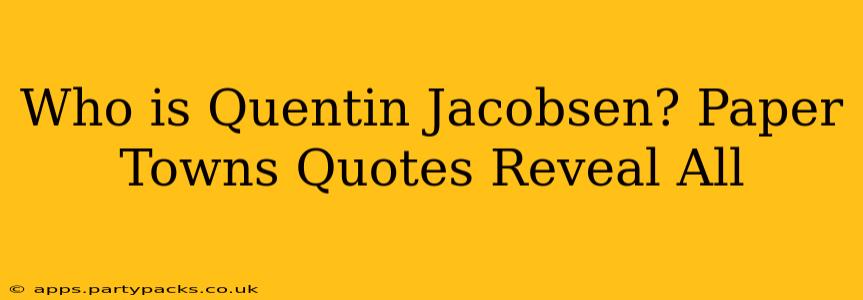Quentin Jacobsen, the protagonist of John Green's acclaimed young adult novel Paper Towns, is a complex and relatable character whose journey of self-discovery resonates with readers. He's not your typical hero; he's an ordinary teenager grappling with extraordinary circumstances, navigating the messy realities of friendship, love, and the search for meaning. Understanding Quentin requires delving into his actions, his internal struggles, and the insightful quotes that illuminate his character. This exploration will unravel the enigma of Quentin Jacobsen through the lens of the novel's most poignant lines.
What are Quentin's Key Personality Traits?
Quentin is initially portrayed as a cautious and somewhat obsessive individual. He's deeply affected by the mystery surrounding his enigmatic neighbor, Margo Roth Spiegelman. His actions, often driven by his intense fascination with Margo, reveal a yearning for adventure and a desire to escape the perceived ordinariness of his life. He's also incredibly loyal to his friends, even when their actions might not always align with his own moral compass. One could argue that his defining characteristic is his intense capacity for both love and heartbreak.
How Does Quentin Change Throughout the Novel?
Quentin's transformation throughout Paper Towns is significant. He starts as a passive observer, content in his routine. Margo's disappearance forces him out of his comfort zone, pushing him to actively participate in the search for her. This journey compels him to confront his own insecurities and limitations, ultimately leading to personal growth. He learns to be more assertive, resourceful, and independent. The experience teaches him valuable lessons about friendship, loss, and the importance of embracing the unknown.
"I'm pretty sure I was born confused."
This quote perfectly encapsulates Quentin's initial state of mind. His confusion stems from his lack of understanding of himself and the world around him. This confusion fuels his fascination with Margo, who embodies everything he isn't – spontaneous, adventurous, and seemingly fearless.
"I was so scared of losing her that I didn’t allow myself to feel anything at all."
This quote highlights Quentin's fear of intimacy and vulnerability. His fear of losing Margo prevents him from fully engaging in their friendship, ultimately contributing to the complexities of their relationship.
"Maybe we all secretly dream of being found."
This powerful quote transcends the specific narrative and speaks to a universal human desire for connection and belonging. Quentin’s search for Margo mirrors a broader search for meaning and purpose in life.
What is the Significance of the Paper Towns?
The concept of "paper towns" – places that exist only on maps but not in reality – becomes a metaphor for Margo herself. Margo is initially presented as a larger-than-life figure, full of mystery and intrigue, but as the novel progresses, Quentin begins to understand that she is also a flawed, vulnerable human being. The search for Margo, and the eventual discovery of her carefully constructed "paper town" existence, allows Quentin to grapple with the illusion versus reality of his own perceptions and expectations.
Is Quentin a Reliable Narrator?
The reliability of Quentin as a narrator is a crucial element to consider. His perspective is inherently subjective, colored by his own biases and emotional responses. While he strives for honesty, his recounting of events is filtered through his own experiences and interpretations. The reader must actively engage with the narrative to piece together the truth, understanding that Quentin's understanding is a process of ongoing revelation.
Frequently Asked Questions (FAQ):
What happens to Quentin at the end of Paper Towns?
The ending of Paper Towns is open to interpretation, leaving the reader to ponder the nature of Quentin's relationship with Margo and his own personal growth. While he doesn't necessarily "find" Margo in the traditional sense, he finds a newfound understanding of himself and his place in the world. He learns to let go of his idealized version of Margo and accepts the complexities of human relationships.
Is Quentin in love with Margo?
Quentin's feelings for Margo are complex and multifaceted. While he is undeniably drawn to her, his feelings are a blend of admiration, fascination, and perhaps even infatuation. His journey is more about self-discovery than a simple romantic pursuit.
What does Quentin learn about himself?
Quentin learns that he is capable of more than he initially believed. He steps outside his comfort zone, actively participates in the search for Margo, and ultimately finds a newfound sense of self-reliance and independence. The experience fosters personal growth and a deeper understanding of himself and his capabilities.
How does Paper Towns end?
The ending finds Quentin accepting the ambiguity of Margo's choices and his own journey. He accepts the loss and embraces the lessons learned. It's a bittersweet conclusion that emphasizes personal growth and the acceptance of life's uncertainties.
Through careful examination of the novel's key quotes and the arc of Quentin's journey, we gain a deeper understanding of this complex and relatable character. He isn't just a protagonist; he is a mirror reflecting the uncertainties and self-discoveries of adolescence. His story reminds us that the search for meaning and identity is a continuous process, one that requires courage, self-reflection, and the willingness to embrace the unexpected.

